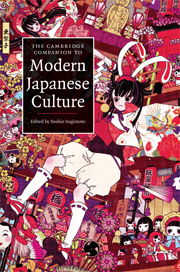Book contents
- Frontmatter
- ‘Japanese culture’: An overview
- 1 Concepts of Japan, Japanese culture and the Japanese
- 2 Japan’s emic conceptions
- 3 Language
- 4 Family culture
- 5 School culture
- 6 Work culture
- 7 Technological culture
- 8 Religious culture
- 9 Political culture
- 10 Buraku culture
- 11 Literary culture
- 12 Popular leisure
- 13 Manga, anime and visual art culture
- 14 Music culture
- 15 Housing culture
- 16 Food culture
- 17 Sports culture
- 18 Globalisation and cultural nationalism
- 19 Exporting Japan’s culture: From management style to manga
- Consolidated list of references
- Index
12 - Popular leisure
Published online by Cambridge University Press: 28 January 2010
- Frontmatter
- ‘Japanese culture’: An overview
- 1 Concepts of Japan, Japanese culture and the Japanese
- 2 Japan’s emic conceptions
- 3 Language
- 4 Family culture
- 5 School culture
- 6 Work culture
- 7 Technological culture
- 8 Religious culture
- 9 Political culture
- 10 Buraku culture
- 11 Literary culture
- 12 Popular leisure
- 13 Manga, anime and visual art culture
- 14 Music culture
- 15 Housing culture
- 16 Food culture
- 17 Sports culture
- 18 Globalisation and cultural nationalism
- 19 Exporting Japan’s culture: From management style to manga
- Consolidated list of references
- Index
Summary
In 1991 the then prime minister of France, Edith Cresson, in the midst of an EU-Japanese trade conflict, caught much attention by comparing the Japanese to ants who stay up all night working. It might be that Cresson's impression of the Japanese was partly drawn from the debate on karōshi, death from overwork, which had begun in the second half of the 80s in Japan and was quickly adopted by those critical of Japan in the West. Such people, especially American intellectuals critical of the Japanese trade surplus with the US, the so-called revisionists or Japan-bashers, had accused Japan of 'social dumping' in the form of long working hours and short vacations. During the 90s, official Japanese economic policy changed, most probably in response to these critics: becoming prime minister in 1991 Miyazawa Kiichi (1919-2007), one of the LDP's most influential politicians for many decades, announced that the aim of his government was to make Japan a 'great country to live in' (seikatsu taikoku). Consequently, the Labour Standards Law (Rōdō kijun hō) was amended in 1993, providing workers with a 40- hour working week and 125 per cent overtime payment. Since management had been very reluctant to accept any further statutory reduction in working hours since the introduction of the 48-hour working week in 1947, this can be called a truly revolutionary change.
- Type
- Chapter
- Information
- The Cambridge Companion to Modern Japanese Culture , pp. 216 - 235Publisher: Cambridge University PressPrint publication year: 2009
- 1
- Cited by



